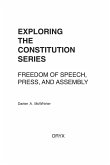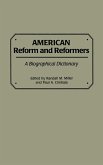This is the first study of the reform oratory of the silver-tongued temperance leader, Frances Willard. It provides a critical analysis of the speaking style of this influential late nineteenth century suffragette, prohibitionist, and leader of women. This work also provides texts of representative speeches, a chronology of important speeches, and a bibliography of primary and secondary sources. The critical analysis points first to Frances Willard's belief in evolutionary Christianity and the equal treatment of women as the basis for her oratory. The study then examines how women's broadening concerns for reform were justified as a response to women's needs to protect their homes. Her campaigns for the Woman's Christian Temperance Union and the woman question and her speeches calling for changes on behalf of labor and to overcome poverty also figure prominently in the analysis. The eloquent speaking style which conveyed her passionate interest in these issues is then exemplified by the texts of six speeches made between 1874 and 1897. As part of Greenwood's Great American Orators Series, this study is intended for students and professionals in rhetoric and communications, women's studies, and history focusing on American reform movements.
Hinweis: Dieser Artikel kann nur an eine deutsche Lieferadresse ausgeliefert werden.
Hinweis: Dieser Artikel kann nur an eine deutsche Lieferadresse ausgeliefert werden.








